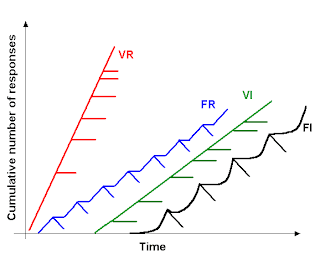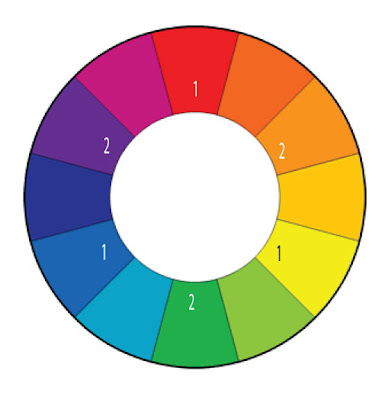Once upon a time, a behavioral scientist called B. F. Skinner discovered that if you rewarded rats with a cookie every time they pressed a button, the rats were more likely to repeat said behavior. The same is true for people. Give a kid a cookie when the kid asks for one and chances are, she’ll ask for another. And another.
Where things get dicey is that if you mess with how frequently the reward is given, you can actually increase the reward-getting behavior substantially. It comes down to what researchers call a Variable Ratio (VR) Schedule. This is the most treacherous schedule of reinforcement because reward is given after a random number of responses (red line on the graph). In other words, give a kid a cookie, but only after she asks for it a certain number of times. Then keep changing that number on her. Chances are, she’ll ask even more often than if you just gave her the cookie when she asked in the first place.
What does this have to do with the query process, you ask? Some might argue that the query process is a variable ratio schedule. This carrot of publication success is dangled in front of us and as writers we have no way of knowing which query or which submission will be “the one.” We never know when we’re going to get a “yes” so we all keep sending out more queries and more submissions, inundating the market, thus making the reward schedule even more random.
Personally, I think that’s a rather glum way of looking at things. To me, writing is more than just a behavior motivated by the reward of publication. Rather, it’s a quiet act of persistence driven by the knowledge that if I do what needs to be done, something good will come of it. Maybe it won’t be the thing I wanted or when I wanted, but if I show up at the page good things can happen.
What about you? How do you view the writing process?








 Call me Gabi (pronounced gah-BEE). I'm a writer, freelance teacher, and a lover of books and words. I'm also the instigator of DIY MFA. iggi's my sidekick, but he thinks he's the brains behind this operation.
Call me Gabi (pronounced gah-BEE). I'm a writer, freelance teacher, and a lover of books and words. I'm also the instigator of DIY MFA. iggi's my sidekick, but he thinks he's the brains behind this operation.
 Mood Music
Mood Music Writing Rituals
Writing Rituals True Colors
True Colors A little R&R
A little R&R